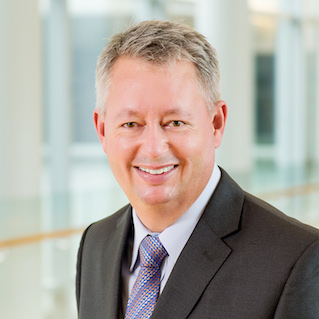“The department already has a great reputation. It has a lot of talented people. It’s a collegial department with a shared sense of purpose. My overall vision is to take the department to the next level of greatness.”
— David Rosenblum, new chair of the Department of Computer Science

David Rosenblum, the new chair of the Department of Computer Science (CS), has several priorities including helping launch the new School of Computing and building CS's relationship with Amazon.
All the pieces are in place to increase the bandwidth of Mason Engineering’s Department of Computer Science (CS), says David Rosenblum, the new chair.
“The department already has a great reputation. It has a lot of talented people. It’s a collegial department with a shared sense of purpose,” says Rosenblum. “My overall vision is to take the department to the next level of greatness.”
He says CS is well-positioned for growth with Amazon HQ2 coming into the Northern Virginia area and funding coming from the state through the Tech Talent Investment Program (TTIP), which seeks to increase the number of Virginia graduates from computer science, computer engineering, and software engineering programs at both the undergraduate and master’s levels.
For his new position, Rosenblum will draw from his diverse background in industry, academia, and research. Before arriving at Mason, he was dean of the School of Computing at the National University of Singapore. He has held industry positions, including being a member of the technical staff at AT&T Bell Labs, as well as academic positions at the University of California, Irvine, and University College London.
Rosenblum’s research interests span many problems in software engineering, distributed systems, and ubiquitous computing, and his current research focuses on uncertainty in software testing and trustworthy machine learning. He has received several awards for his research and service.
“I’ve had the opportunity to work on a variety of research problems from many areas of computer science, which has allowed me to publish frequently outside my home area of software engineering,” he says. “But any success I’ve enjoyed as a researcher has come from working with talented PhD students and long-time collaborators.”
At Mason, he hopes to spend one day a week continuing his research, but his top priority will be his duties as chair. His three priorities for the department include:
- Shepherding the new School of Computing effort. The school will provide a wide array of computing and related courses to students from all backgrounds and at all levels. “We have a large and diverse faculty that will make us well-positioned for this effort,” he says. “And the department is continuing to grow, with a dozen new faculty recruited for the fall 2020 semester.”
- Making the most of the relationship with Amazon. “I want to go beyond the usual ideas of getting students internships and jobs to find deeper levels of engagement with Amazon, like a research center or institute where they would be an equal partner with us addressing both technological and non-technological problems relevant to their business, such as the economic and ethical issues stemming from the widespread use of drones and robots in the automation of work.”
- Building more bridges with schools and colleges across Mason. “I want to explore the possibility of new interdisciplinary educational and research collaborations. The department has been very successful at this already, but I would like to see it broadened so that we work with units beyond our traditional cognate disciplines in science and engineering,” he says. For example, computer scientists could work with social scientists on programs looking at human behavioral problems in cybersecurity.
Students who major in computer science have a big world of opportunities awaiting them, he says. “If students don’t want to major in computing, they should consider a minor, which would be worthwhile for careers in many different fields.”
“In my view, computing is central to every other discipline and every aspect of business and society. The opportunities are endless for us to interact with other areas—humanities, health care, business, and others.
Sanjeev Setia, professor and associate dean for computing programs and initiatives for the Volgenau School of Engineering, says, “Interdisciplinary collaboration in research and education is a key component of the department's vision and strategic plan for the future, and we are thrilled to have been able to attract someone with David’s stature to be the chair of the department.”
Rosenblum is glad to be back at a university in the United States where department heads and faculty have “a strong culture of shared governance. In the United Kingdom, department heads and deans tend to work more autonomously, which allows them to get things done quickly sometimes, but which also makes faculty feel that they don’t have a voice in major decisions.”
As chair, Rosenblum plans to have a weekly open-door hour—or open-webcam hour during COVID-19—where faculty can talk one-on-one with him about whatever they want.
“I try to be transparent with people,” he says. “I try to be constructive and celebrate excellence in people. I try to be a consensus builder and not rule by fiat. It’s important that faculty feel their views are heard, considered, and respected.”
“Interdisciplinary collaboration in research and education is a key component of the department's vision and strategic plan for the future, and we are thrilled to have been able to attract someone with David’s stature to be the chair of the department.”
— Sanjeev Setia, professor and associate dean for computing programs and initiatives for the Volgenau School of Engineering,
